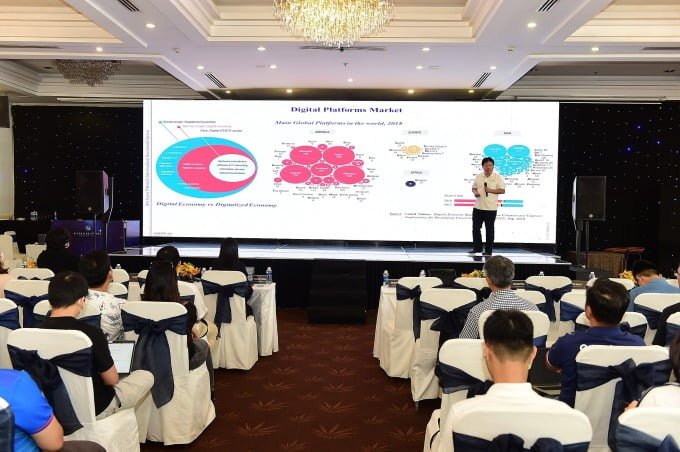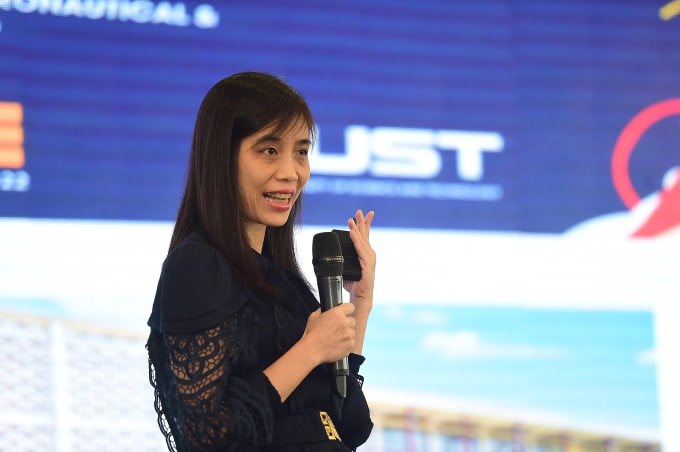
Opening Workshop on Recruitment and human resources for AI on the afternoon of September 22 in Ho Chi Minh City within the framework of Vietnam Artificial Intelligence Festival (AI4VN), Dr. Dinh Van Dung, Institute of Information Technology – National University Hanoi, citing reports showing that 90% of the world’s digital economic market share is in the hands of large foreign corporations.
“AI is becoming one of the big driving forces driving the digital economy and is mentioned a lot in Vietnam. However, we still do not have a mark on the global AI map. Hopefully in the next 5 years, Vietnam will Nam may appear international names in the field of artificial intelligence,” Mr. Dung said.

Dr. Dinh Van Dung, Institute of Information Technology, Hanoi National University opened the Recruitment Workshop on the afternoon of September 22 in Ho Chi Minh City. Photo: Thanh Tung
According to Mr. Dung, in the future, AI human resource training must be approached in an interdisciplinary manner. In order for technology to create breakthroughs and deeply participate in the digital economy, technology workers must not only understand technology but also understand how agriculture, healthcare, education… Similarly, experts in other industries also need to understand technology to be able to apply AI in their fields.
Dr. Dung believes that to prepare for the upcoming AI workforce, the Vietnamese education system must coordinate from both schools and businesses. Future AI training institutes must be built on four pillars including: Smart devices; connection and communication network; core digital platforms and progressive educational platforms.
The fastest way to learn AI
Agreeing with Mr. Dinh Van Dung’s comments, Nguyen Hoang Bao Dai, a music producer and AI researcher, said that when talking about artificial intelligence, we will always have to associate it with another industry. For example, when working on language analysis AI, engineers must understand language. Similar to the AI fields of music, security, and medicine, engineers take twice as long to learn as other fields.
This also leads to another risk that some people will not be persistent enough to pursue their studies to the end. “Personally, I have an interesting tip for anyone who is ‘skilled’ but wants to study AI: they should learn from the top down, instead of learning from the bottom up like the traditional way of training in school,” Bao Dai said. .

Music producer and AI researcher Nguyen Hoang Bao Dai. Photo: Thanh Tung
The AI music producer explained that if you learn from the bottom up, many people are easily frustrated when they have to access complex, foundational knowledge without immediately seeing results. Instead, depending on the field they are interested in, everyone can go to an open source code repository like GitHub to download, replace their own data and test run it. This does not require too much effort in tinkering and programming, but you can still see the results immediately. Once they see the results, learners will have more motivation to continue pursuing their passion, deepening their research to go a long way in learning and researching AI.
“To be able to plant the Vietnamese flag on the world AI map, we must build it, not just use it. To make a product, we need to understand the nature and core values to make a system,” Bao said. Dai said.
Challenges of AI ambitions in Vietnam
Continuing the story of making Vietnam a bright spot on the world AI map, Associate Professor. Huynh Thi Thanh Binh, Vice Principal of the School of Information and Communications – Hanoi University of Science and Technology, said that to achieve the goal of being in the group of 5 leading countries in ASEAN in AI by 2025, Vietnam needs to achieve one of two conditions: Built 5 valuable AI brands in the region and developed a national storage center for big data and high-performance computing.
However, Vietnam is facing great challenges in training a large number of high-quality personnel to realize this plan. “In the whole of Vietnam, there are only 28 schools and 40 programs registered with MOET for in-depth training in AI. Other schools have an AI orientation but are in the Computer Science program. This leads to a serious shortage. high quality human resources,” Ms. Binh said.
She also cited TopDev’s report showing that by 2023, Vietnam will have a shortage of about 150,000 IT human resources, and by 2025, this number will increase to 200,000 engineers.

Associate Professor. Huynh Thi Thanh Binh, Vice Principal of School of Information and Communications, Hanoi University of Science and Technology. Photo: Thanh Tung
To solve the problem of human resources, large universities such as Hanoi University of Science and Technology have signed many training programs with universities and large businesses in Vietnam and the world to nurture talent and increase talent. Enhance practice, foreign research exchange, and internships at businesses.
During the discussion session, many high school students and students asked the speakers questions about what they need to prepare to study AI engineering training programs. According to experts, to pursue the AI dream, the young generation must not only cultivate basic mathematical knowledge but also be good at foreign languages, skills and proactively seek new knowledge, while still young. sitting on a school chair.
Khuong Nha

Leave a Reply
You must be logged in to post a comment.